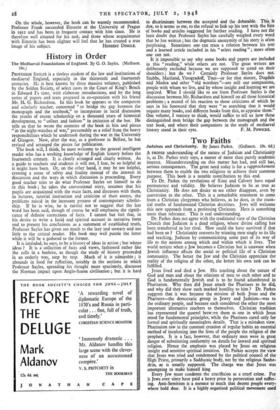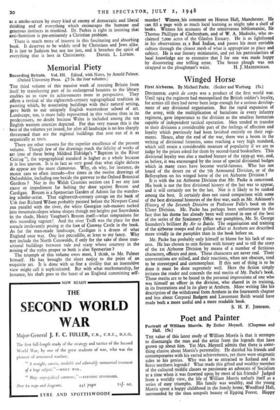Two Faiths
Judaism and Christianity. By James Parkes. (Gollancz. 10s. 6d.) A PROPER understanding of the nature of Judaism and Christianity is, as Dr. Parkes truly says, a matter of more than purely academic interest. Misunderstanding on this matter has had, and still has, serious consequences. The great need today is for a rapprochement between them to enable the two religions to achieve their common purpose. This book is a notable contribution to this end.
To Dr. Parkes the revelations of Sinai and Calvary have equal permanence and validity. He believes Judaism to be as true as Christianity. He does not desire to see either disappear, even by conversion to the other. This is a remarkable statement to come from a Christian clergyman who believes, as he does, in the essen- tial truths of fundamental Christian doctrines. Jews will welcome this new approach from a professing Christian. Here is something more than tolerance. This is real understanding.
Dr. Parkes does not agree with the traditional view of the Christian Church that Judaism is a dead religion, whose divine calling has been transferred to her rival. How could she have survived if that had been so ? Christianity converts by winning men singly to its life and teaching, Judaism by communicating some part of its way of life to the nations among which and within which it lives. The world notices when a Jew becomes a Christian but is unaware when Jewish influence affects the social or political life of a Christian community. The better the Jew and the Christian appreciate the reality of the religion of the other, the better his own task can be fulfilled.
Jesus lived and died a Jew. His teaching about the nature of God and man and about the relations of men to each other and to God is fundamentally Jewish and is to be found adumbrated in Pharisaism. Why then did Jesus attack the Pharisees as he did, and why did they show such marked hostility to him ? Dr. Parkes suggests that it was because the mission of both Jesus and the Pharisees—the democratic group in Jewry and Judaism—was to the ordinary people, and because each considered the other the most important alternative teachers to themselves. Christian tradition has represented the quarrel betw2en them as one in which Jesus stood for fundamental principles, while the Pharisees cared only for formal and spiritually meaningless details. That is a mistaken view. Pharisaism saw in the constant creation of regular habits an essential method of inculcating into the lives of the people the religion of the prophets. It is a fact, however, that ordinary men were in great danger of substituting conformity on details for inward and spiritual religion. Hence the emphasis was placed by Jesus on religious insight and sensitive spiritual intuition. Dr. Parkes accepts the view that Jesus was tried and condemned by the political council of the High Priest, primarily a Sadducaic body, not by the religious Sanhe- drin, as is usually supposed. The charge was that Jesus was attempting to make himself king.
Every Jew must condemn the crucifixion as a cruel crime. For it Jews ever since have paid a heavy price in persecution and suffer- ing. Anti-Semitism is a menace to much that decent people every- where hold dear. It is a highly organised political movement used
as a smoke-screen by every kind of enemy of democratic and liberal thinking and of everything which encourages the humane and generous instincts in mankind. Dr. Parkes is right in insisting that anti-Semitism is pre-eminently a Christian problem.
There is much more of interest in this fascinating and absorbing book. It deserves to be widely read by Christians and Jews alike. It is just to Judaism but not too just, and it breathes the spirit of everything that is best in Christianity. DANIEL L. Lirsort.







































 Previous page
Previous page